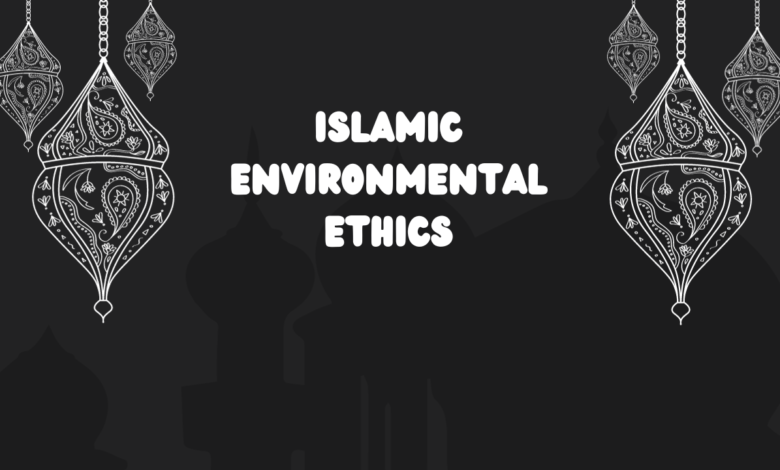Islamic Environmental Ethics
Nurturing Our Planet through Islamic Environmental Ethics

Islamic Environmental Ethics
Islamic environmental ethics are principles and guidelines derived from the Quran, Hadith (teachings of Prophet Muhammad), and Islamic tradition that emphasize the responsibility of humans to care for and protect the environment.

Introduction
In today’s world, as the global environmental crisis escalates, there is a growing recognition of the need for ethical frameworks that guide our relationship with the environment. Islamic environmental ethics, deeply rooted in the teachings of the Quran and the traditions of Prophet Muhammad (peace be upon him), offer a unique perspective on environmental stewardship and sustainability. These principles not only emphasize the importance of preserving the natural world but also provide a comprehensive framework for harmonizing human activities with the well-being of the planet.
The Quranic Foundations
Islamic environmental ethics find their foundations in the Quran, which is considered the holy book of Islam. Throughout the Quran, there are numerous verses that highlight the significance of the natural world and the responsibility of humanity as stewards of the Earth. For instance, Surah Al-Baqarah (2:164) states: “Indeed, in the creation of the heavens and the earth, and the alternation of the night and the day, and the [great] ships which sail through the sea with that which benefits people, and what Allah has sent down from the heavens of rain, giving life thereby to the earth after its lifelessness and dispersing therein every [kind of] moving creature, and [His] directing of the winds and the clouds controlled between the heaven and the earth are signs for a people who use reason.“
This verse underscores the signs of God’s creation and the balance of nature, inviting humans to reflect upon the intricate systems of the natural world.
Also check.
- Who is the Wessiah in Islam?
- What is Wudu in Islam?
- What is Jihad in Islam?
- Why did Islam Spread So Quickly?
- Why Does Allah Test Us?
- What are the Holy Books of Islam?
Stewardship and Accountability
In Islamic tradition, humans are regarded as stewards (khalifah) of the Earth, tasked with the responsibility of caring for and preserving the environment. This stewardship entails the careful management of natural resources, the protection of biodiversity, and the avoidance of wastefulness. The concept of accountability before God (Allah) is central to Islamic ethics, and this extends to one’s treatment of the environment. Muslims are taught that they will be held accountable for their actions, including those that affect the natural world.
Prophet Muhammad’s Teachings
The Hadith, which contains the sayings and actions of Prophet Muhammad (peace be upon him), provides additional guidance on environmental ethics. The Prophet emphasized the importance of respecting and conserving natural resources. For example, he discouraged wastefulness, saying, “Do not waste water, even if you perform your ablution on the banks of an abundantly-flowing river” (Ibn Majah). This hadith underscores the principle of moderation in resource use.
Additionally, Prophet Muhammad advocated for the humane treatment of animals, stressing the importance of compassion. He once narrated the story of a woman who entered Hellfire due to her mistreatment of a cat, highlighting the significance of being kind to all living creatures.
Sustainable Practices
Islamic environmental ethics encourage sustainable practices that align with the principles of conservation, justice, and equity. Muslims are encouraged to engage in activities that do not harm the environment or exploit its resources recklessly. Concepts such as “sadaqah” (voluntary charity) can be extended to environmental causes, supporting initiatives aimed at reforestation, water conservation, and waste reduction.
Challenges and Contemporary Relevance
While Islamic environmental ethics provide a strong ethical framework for addressing environmental challenges, there are practical obstacles to implementing these principles on a global scale. These challenges include industrialization, urbanization, and population growth, which often result in increased consumption and environmental degradation. Additionally, there may be variations in interpretation and practice of these ethics among different Muslim communities.
However, many contemporary Muslim scholars and organizations are actively working to promote environmental awareness and sustainable practices. They are striving to integrate Islamic ethics with modern environmental science and policy to address issues like climate change, pollution, and habitat destruction.
Conclusion
Islamic environmental ethics offer a profound and timeless framework for responsible stewardship of the Earth. Rooted in the Quran and the teachings of Prophet Muhammad (peace be upon him), these principles emphasize the interconnectedness of all living beings and the importance of preserving the environment for future generations. By embracing these ethics and incorporating them into daily life, Muslims and non-Muslims alike can contribute to a more sustainable and harmonious coexistence with the natural world, addressing the urgent global environmental challenges we face today.

FAQs
What is Islamic environmental ethics?
Islamic environmental ethics are principles and guidelines derived from the Quran, Hadith (teachings of Prophet Muhammad), and Islamic tradition that emphasize the responsibility of humans to care for and protect the environment.
What is the foundation of Islamic environmental ethics?
The foundation of Islamic environmental ethics lies in the Quran, where numerous verses highlight the importance of nature and humanity’s role as stewards of the Earth.
What is the concept of stewardship in Islamic environmental ethics?
Stewardship in Islamic environmental ethics refers to the idea that humans are caretakers (khalifah) of the Earth and are responsible for preserving and managing its resources.
What role does accountability play in Islamic environmental ethics?
Accountability is a significant aspect of Islamic ethics, and it extends to how humans treat the environment. Muslims believe they will be answerable to God for their actions, including their treatment of nature.
How does Prophet Muhammad’s teachings contribute to Islamic environmental ethics?
Prophet Muhammad’s Hadith includes teachings that discourage wastefulness, promote resource conservation, and emphasize compassion and kindness towards animals—all of which align with Islamic environmental ethics.
What are some practical examples of sustainable practices in Islamic environmental ethics?
Sustainable practices in Islamic ethics include conserving water, avoiding wastefulness, practicing moderation in resource use, and supporting environmental initiatives such as reforestation and waste reduction.
Are there contemporary challenges to implementing Islamic environmental ethics?
Yes, contemporary challenges include industrialization, urbanization, population growth, and variations in interpretation among Muslim communities. These challenges can hinder the widespread adoption of these ethics.
How are contemporary Muslim scholars and organizations addressing environmental challenges?
Many Muslim scholars and organizations are actively promoting environmental awareness, conducting research, and advocating for sustainable practices. They work to integrate Islamic ethics with modern environmental science and policy.




